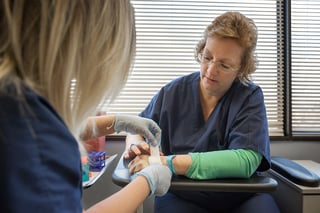"Allied health" is a bucket term used for many frontline healthcare workers such as medical assistants, pharmacy technicians, billing & coding specialists and more. These professionals are often the first people patients encounter, and play an important role in their overall care experience.
Today we celebrate these healthcare professionals and provide some greater understanding about who they are and why they are so vital. (As well as share some lesser-known tidbits that might come in handy for your next trivia night.)
Without further ado, here are 10 surprising facts about the allied health workforce:
1. The need for allied health workers began after World War II, when demand for healthcare increased and hospitals were no longer the only place to receive treatment. (source)
2. The term “allied health” wasn’t used until the 1990’s. (source)
3. Allied health professionals comprise nearly 60% of the healthcare workforce. (source)
4. Jobs in the industry will grow from 15.6 million to 19.8 million between 2010 and 2020. (source)
5. Demand for allied health workers is high — 73% of the counties in Texas are designated as “Health Professions Shortage Areas.” (source)
6. Medical assistants are among the most rapidly-growing medical jobs. (source)
7. Phlebotomy has an interesting heritage rooted in an ancient practice of bloodletting.
8. Due to diverse training and education, allied health workers can work in a variety of settings, from hospitals and clinics, to insurance providers and pharmaceutical companies.
9. Most allied health certifications take between 1-2 years to earn, a minimal time investment compared to potentially life-changing career effects.
10. There's actually a big difference between a certification and a "certificate of completion" that can have implications on a job candidate's marketability. (More on that in our free guide, "5 Things to Know About Certification".
 OK, so maybe these topics won't come up in trivia night. But they could at least impress your friends at your next dinner party. And hopefully a couple of facts impressed you!
OK, so maybe these topics won't come up in trivia night. But they could at least impress your friends at your next dinner party. And hopefully a couple of facts impressed you!
Allied health continues to play an increasingly important role in our healthcare system. NHA is proud to support allied health professionals in all that they do to improve their lives, and the lives of others.

